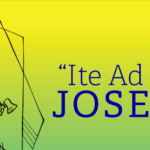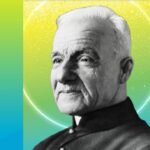When all the land of Egypt was famished, the people cried to Pharaoh for bread and he said to all the Egyptians, “Go to Joseph…” (Genesis 41:55)
Typology of St. Joseph (NT) and Joseph,
the Patriarch (OT)
To the one thirsty for the truth, to the one who yearns to unravel piece by piece the mystical storytelling that The Creator has weaved so intricately through the narrative of Sacred Scripture, we see as St Augustine remarks, how the New Testament lies hidden in the old and the Old Testament is unveiled in the new. In Biblical typology, a person, usually from Old Testament times—foreshadows someone in the New Testament.
The Patriarch Joseph from the Old Testament is said to be the prefigurement of St. Joseph in the New Testament. Is it a coincidence that their fathers names were Jacob? According to the genealogy at the beginning of Matthew’s Gospel, St. Joseph had a father named Jacob. It is a well-known fact that Joseph from the Old Testament was Jacob’s favorite son from Rachel.
They are both forced into Egypt, both not of their own choice. The tyranny of Herod drives St. Joseph with the Holy family into Egypt. The jealousy of his older brothers, sends Joseph the patriarch, as a slave into Egypt.
They were both known to be divinely-inspired dreamers. St. Joseph’s heaven-sent dreams enabled him to guide and protect his Holy Family. Enlightened by celestial dreams, the Patriarch Joseph’s leadership enabled him to feed his own family and the nation at large with bread. St. Joseph flees from Bethlehem, Aramaic, meaning “House of Bread” to protect the “Bread of Life.” In the Book of Genesis, during a time of famine across the known world, the Egyptians begged their pharaoh for bread and Pharaoh in turn replied, “Go to Joseph and do whatever he tells you.”
Interestingly, both have their share of problems with women because of the pure hearted men they were! His chaste mind leaves St. Joseph to make a decision when he finds out Mary is with child. Joseph, the Patriarch has to flee from the hands of the wife of Potiphar, despite the formidable repercussions.
After their death, both of their remains are believed to have been taken back home. In Exodus, we are told that Moses fulfilled the pledge by taking Joseph’s bones back home with him when he left Egypt. There has been a longstanding pious tradition in the Church that St. Joseph was assumed body and soul into heaven.

St. Andre Bessette of Montreal … ‘Went to Joseph!’ The greatest yearning St. Andre ever had, was for the spotlight to be on St. Joseph’s life. “It is St. Joseph who cures. I am only his little dog.” Following the ardent gaze of St. Andre, let us also heed this prompt to “Go to Joseph..”, to dive deeper and ponder into the person of St. Joseph through the lenses of typology, comparison and reflection and allow it to stir in us, whatever the breath of God desires.
His chaste mind leaves St. Joseph to make a decision when he finds out Mary is with child. Joseph, the Patriarch has to flee from the hands
COMPARISON
of St Joseph (NT) and Adam (OT)

J oseph and Mary arc the summit from which holiness spreads all over the earth whereas, and as Blessed Gabriele Allegra once said, “Adam and Eve were the source of evil which was unleashed on the world whereas Joseph and Mary arc the summit from which holiness spreads all over the earth.”
Adam, when faced with the threat to his family in the Garden of Eden, stands idle or in complacency and does not take charge of his household. St. Joseph on the other hand, protects the family when it is threatened and is watchful, alert and ready even in his rest. In Genesis, God puts Adam to sleep, and in his sleep, God gives him his spouse Eve. In Joseph’s slumber, the cherubs whisper God’s desire into his ears, prompting him to go ahead and take Mary to be his wife.
REFLECTION 1
Joseph’s Deafening Silence
As deafening as Joseph’s silence seems to be, it was not a passive silence. Not a word has been recorded as his in holy scripture. It was not the silence of one who gives in to sin as Adam did, but of one who is attentive to the way of God and the Word of God. This silent listening of Joseph, is his point of rest, his point of total connection to the divine.
It is no accident that God sent his angels to Joseph in dreams, because though physically asleep – he rested in an attitude of listening. But the silence of Joseph has its own special eloquence, for thanks to that silence we can understand the truth of the Gospel’s judgment that he was “a just man” (Mt 1:19)
REFLECTION 2
A Man of Action!
Joseph, the one we know from the Gospel, is a man of action. When Joseph awoke from sleep, we read in the Gospel of Matthew, he ‘DID’ as the angel of the Lord commanded him. In these few words there is everything. The whole description of Joseph’s life and the full characteristics of his holiness is encapsulated in: “He did.” He is a man of work and quiet action. The Gospel has not preserved any word of his. It has described, on the contrary, his actions: simple, everyday actions.
Joseph in the Old Testament prefigured St Joseph. It is through little St Andre in the 1900’s that God chose to raise one of the greatest devotions to St Joseph and through whose hand the greatest shrine in the world in his name was built. Today what might be our role in the unfolding of this devotion?
In the rich tapestry of interwoven narratives that Sacred Scripture and Sacred Traditions reveal to us, we cannot but be left in wonderment and ponder whether the TODAY and OUR PRESENT DAY lives as well, don’t maybe also have a role to play in the unfolding of God’s mystical storytelling, which in due time will all connect and we will one day in eternity witness the unfolding of a massive reveal.
RESOURCES:
Patris Corde – With a Father’s Heart – Pope Francis Redemptoris Custos –
Guardian of the Redeemer – St. Pope John Paul II
REFLECTIONS QUESTIONS
- Reflecting on the ways St. Joseph responded to trials in his life and the
actions he took, what areas of your life are you passive about, that God
might be asking you to be more present to? - Reflecting on his dreams and his response to them, how can your interior
lives reflect Joseph’s interior life or relationship with God ? - What does God want to reveal to you or the Church through St. Joseph?




